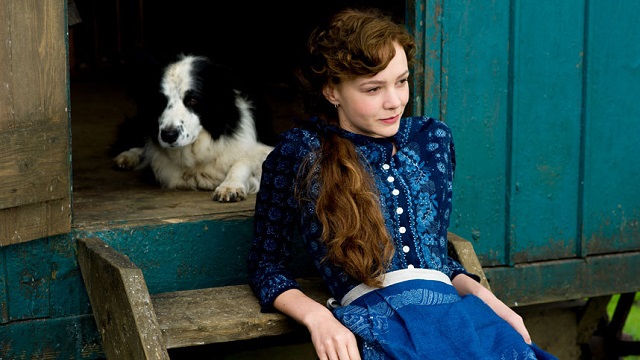Thomas Hardy’s novels reveal a certain level of contempt for societal convention, politeness, and rules. His final novel, Jude the Obscure, was decried as obscene for his criticism of economic strata, marriage, and religion. Throughout Jude the Obscire, Hardy constantly chopped Jude’s hopes, dreams, and aspirations to size using society’s niceties and norms.
His first major success, Far From the Madding Crowd, is a far gentler novel but no less biting. It centers around Gabriel Oakes, a farmer who loses his flock and farm forcing him to become a shepard, and his love interest Bathsheba Everdeen, an independent woman who inherits a farm and has to deal with constant advances from a variety of love interests.
Thomas Vinterberg’s latest adaptation of this novel completely focuses the story on Bathsheba, highlighting the struggles of an independent woman in a society ruled by men. Bathsheba begins the film as a farmhand, outcast from society after her independence soiled her reputation rendering her unsuitable to be a governess. As she arrives to her aunt’s farm, she passes by Farmer Gabriel Oakes, who immediately brings her a baby lamb and asks to marry her. She declines, telling him that she needs to be tamed.
After Farmer Oakes’ dog chases his flock of sheep off the cliff, he loses his farm and is forced to look for work. At the same time, Bathsheba’s uncle dies leaving his estate and farm to her, turning her into a mistress in a man’s world. Through incidents of fate, Bathsheba hires Gabriel to be her farm’s shepherd, thus reversing the roles of privilege.
As Bathsheba struggles to turn her farm around, she plays with the affection of the rather bland middle-aged Mr. Boldwood, a very successful local farmer. Meanwhile, Sergeant Troy lurks in the background of the story, wooing Fanny Robin, one of Bathsheba’s former workers. Many complications ensue.
Vinterberg’s adaptation of this rather soapy and unwieldy novel narrows its focus at the expense of both time and character. By compressing two years of the lives of five characters into a breezy 119 minutes, Vinterberg leaves little room or time to think or breathe. The near constant thrust almost renders the title ironic. Characters drop in and out of the film when it’s convenient, with Fanny Robin receiving the most vicious of the cuts.
Despite the cuts, this adaptation is so much fun. While it certainly retains the usual trappings of classic-lit adaptations, Vinterberg works hard to modernize the pacing and rhythms. Far From the Madding Crowd isn’t as adventurous as Joe Wright’s Anna Karenina, but he almost achieves a speedy brutality finding the ironic comedy that defines Hardy’s novels. When Farmer Oakes first proposes to Bathsheba, it seems sudden and ridiculous, as Hardy would have wanted. Vinterberg constantly undercuts the actions of his characters by rending them ridiculous through pacing.
Vinterberg’s modernization extends to the updating of feminist themes, but here’s where the film and story step into murky waters. Bathsheba spends the first hour as an independent woman fending off all the advances, seemingly waiting until it feels right. The next two acts work towards her getting married and figuring out who would be her perfect partner. The saving grace is that both men and women find self-worth in love and marriage, and humiliation abounds for almost every character in the film.
The tension of Far From the Madding Crowd comes from the expectations set up by a Hardy novel. Tragedy, death, humiliation, and violence can happen to anyone at any time. Even animals aren’t safe from the constant peril Hardy and Vinterburg pepper through the story. If you haven’t read the story, you never know whose reputation will suffer from one act to the next, creating a perfect distillation of the Hardy atmosphere of humorous dread mixed with romantic aspirations.
By charging through the novel with an almost reckless abandon, Far From the Madding Crowd almost achieves a passionate breathlessness. Carey Mulligan shines in her fierce determination, as does Michael Sheen as the overly-humble Mr. Boldwood. The final product is so much fun you almost forgive it its faults.

